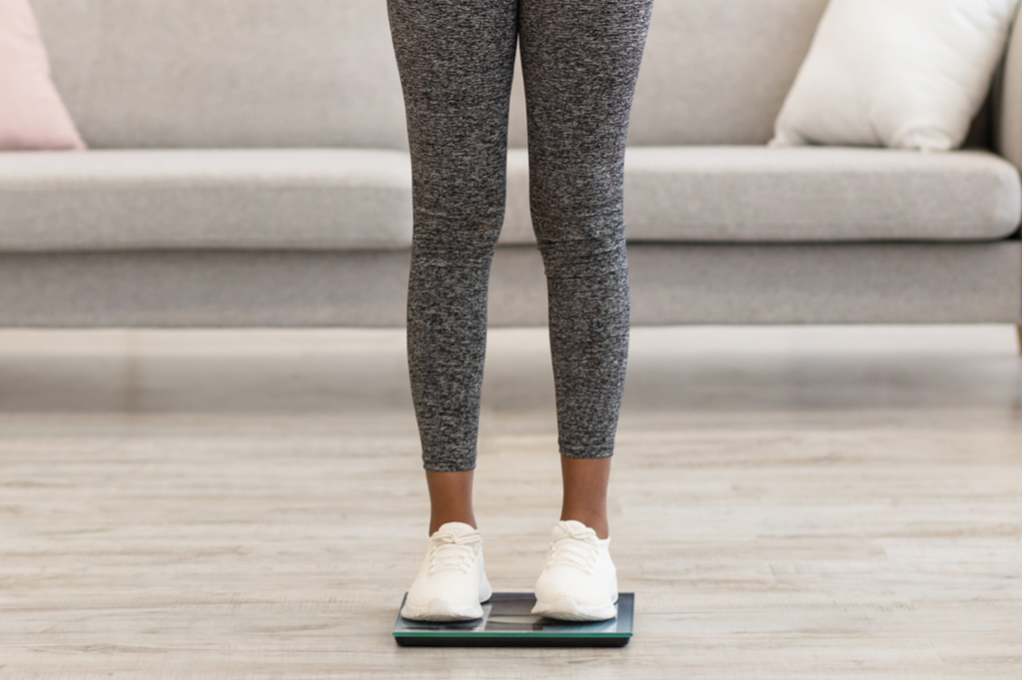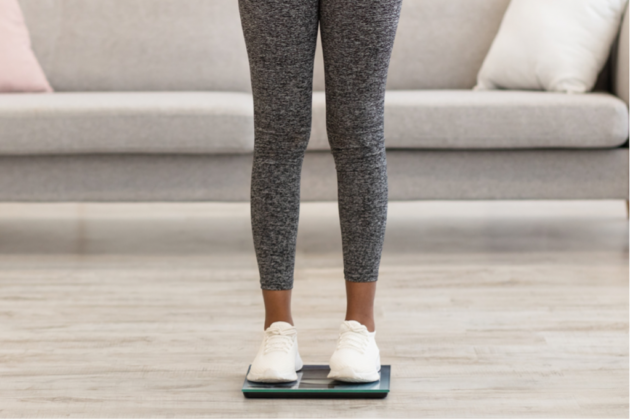Postpartum Weight Gain: What to Do If You’re Gaining Weight While Breastfeeding
Whew. The baby is here! It’s time to lose that pregnancy weight. It should fall off easily now!
Not so fast! The idea that your pregnancy weight will fall off without any effort is mostly a myth. Whether or not you are breastfeeding, weight gain after giving birth is frustrating but very possible.
Remember that the weight you gained during pregnancy was necessary for your baby’s growth and development while in the womb. The extra fat stores you gained are still needed if you’re breastfeeding to help you feed both your baby and you during this important time.
Still, there is no healthy reason to gain weight after giving birth unless you were very underweight before your pregnancy.
There are several reasons why postpartum weight gain can happen. You can gain weight simply by overeating or reducing your levels of exercise after giving birth. If your weight gain is from neither of these, you may have to look into other causes, such as postpartum thyroiditis, diabetes, and PCOS (polycystic ovary syndrome).
To help lose weight while breastfeeding or after giving birth, in general, you can increase your fiber intake, eat slower, consume plenty of protein and healthy fats, stay hydrated, and more.
This guide goes over why postpartum weight gain and weight gain during breastfeeding happen, how you can make sure you’re maintaining your weight or losing a healthy amount of weight, and much more.

Get Postpartum Support from a Registered Dietitian
Insurance Accepted: 90% of Zaya Care patients pay $0 for visits with an RD
Is gaining weight after giving birth and during breastfeeding normal?
A natural pattern of weight loss begins in the first few hours and days after giving birth. The amniotic fluid and placenta are lost immediately, followed by the weight of the excess circulating blood no longer needed.
By six weeks postpartum, the uterus shrinks to its former size and weight. These processes account for 12 to 17 pounds. If you gained 25 to 35 pounds during pregnancy, half of this amount should remain as fat stores.
Only about one in three women lose all of their pregnancy weight at the six-week mark. The rest will need to work harder to lose their fat stores.
Breastfeeding helps some women lose more weight by siphoning off some calories for the baby. Research shows that exclusively breastfeeding for 3 months leads to weight losses of around 3 pounds more than if you don’t breastfeed.
Weight gain in the postpartum state is not a natural process. There are reasons why it happens that need to be explored with a nutritionist or your healthcare provider.
What causes postpartum weight gain and weight gain during breastfeeding?
The natural trajectory for weight after giving birth is generally downward. Remember that the recommended pregnancy weight gain is between 25 and 35 pounds. If only half of your gestational weight gain is the placenta, uterine size, and increased blood volume, you’ll still have a minimum of about 10 pounds of weight to lose. Healthy postpartum weight loss is essential but not always easy.
Failing to lose this extra weight by the end of one year means you’ll face long-term health consequences, including diabetes and heart disease. If you have similar issues with more than one pregnancy, the excess weight can affect your other pregnancies and may lead to a lot of extra weight gain.
There are several causes of weight gain after giving birth in breastfeeding mothers:
- PCOS. Because PCOS is mostly a metabolic disease, it is often accompanied by obesity and diabetes. This combination of factors makes it harder to lose weight, even when food intake is restricted.
- Postpartum thyroiditis. Postpartum thyroiditis may initially cause weight loss as the metabolism increases due to thyroid gland overactivity. Over time, however, the thyroid gland function diminishes, and metabolism slows. A slow metabolism is linked to weight gain.
- Type 2 diabetes. Type 2 diabetes is also a metabolic disease in which weight loss is more difficult than in non-diabetic women.
- Postpartum depression. Postpartum depression is seen in about 12% of postpartum women. While some will have weight loss issues, others will snack or overeat at meals to soothe their low mood. If you have postpartum depression, your chances of overeating and gaining weight are higher than women without this problem.
- Social factors. Social factors like food insecurity or inadequate access to healthy foods may mean you have to make food choices that are higher in fat, processed, or junk food. This will naturally lead to higher incidences of obesity and weight gain after giving birth.
- Prior obesity. If you are obese before you get pregnant, not only are you likely to gain more weight when pregnant, but it will also be harder to lose that weight afterward. The reasons for this are many and not entirely understood.
- Ethnic background factors. When all other factors are eliminated, some ethnic groups are linked to weight gain after giving birth. African and Polynesian heritages are most often linked to gaining weight after giving birth.
Are there any reasons why breastfeeding alone can cause weight gain? There are factors seen almost entirely in breastfeeding that may contribute to weight gain with breastfeeding:
- Breastfeeding hormones. The hormone prolactin released during breastfeeding tends to reduce the ability to lose weight in some women. This hormone is released every time you nurse and may contribute to weight gain even when breastfeeding if you’re prone to gaining weight anyway.
- Appetite changes. For reasons not quite understood, breastfeeding women tend to be extremely hungry. Your enhanced hunger may mean that you’ll consume more calories than you need for both you and your baby.
- Lack of sleep. Breastfeeding challenges your ability to get a full night of sleep. Your baby tends to breastfeed more often than bottle-fed babies—even during the night. Lack of sleep exerts changes in your metabolism and appetite hormones that may contribute to increased appetite when breastfeeding.

Get Postpartum Support from a Registered Dietitian
Insurance Accepted: 90% of Zaya Care patients pay $0 for visits with an RD
Strategies for dealing with postpartum weight gain & weight gain from breastfeeding
Losing weight after having a baby is challenging when you have so much to think about. If you’re gaining weight unexpectedly and don’t know why, be sure to talk to your healthcare provider to ensure you don’t have something reversible like diabetes, postpartum thyroiditis, or PCOS.
If your provider doesn’t see anything concerning, you can use some simple strategies to prevent weight loss and lose weight safely, including developing a healthy breastfeeding meal plan.
Some strategies for losing weight postpartum include:
- Eat several small meals daily. About 5 to 6 small meals are preferable to large meals. Your body tends to use energy better if you feed it little by little. Snacks are great if they are healthy, such as fruits, whole grain crackers, cheese slices, or nuts/seeds.
- Avoid skipping meals. This is especially true if you are breastfeeding. Skipping meals also signal to your body that you need to store rather than use the calories you eat. Make sure to start your day with breakfast, too.
- Make fiber your friend. Think about the fiber content of your diet. Oranges have more fiber than orange juice, for example, while beans, raw veggies, and whole grains are better options than foods low in fiber (white rice, processed foods, and meats). Your body is fuller longer and your weight loss will be smoother with foods containing more fiber. Note that fiber can cause postpartum gas. While it’s not a reason to avoid it, if you start experiencing it, know that fiber may be contributing.
- Eat slowly & seated at the table. It is so easy to eat on the run or while cooking or watching the kids play, but it is also easier to eat a lot more calories if you aren’t conscious of what you’re eating.
- Remember that protein, fiber, & healthy fats make you fuller longer. Fats and protein are great choices if you choose healthy sources. For example, you can get protein in lean meats rather than lunch meats with fewer saturated fat calories. Nuts and seeds have healthy fats your body needs.
- Drink up. Keep your water bottle handy and sip continuously so you never get dehydrated and will feel fuller. Your baby needs those liquids, too, if you are breastfeeding.
- Drink water instead of sugary beverages. Juices, sodas, and energy drinks are loaded with calories you don’t need. Your baby doesn’t need a diet of artificial sweeteners, so you should avoid these if breastfeeding.
- Pay attention to food preparation. Broiling, grilling, baking, and microwaving foods are better options than frying foods of any kind. Limit breaded chicken/fish and eat grilled/broiled versions instead. As another example, olive oil is a healthier option than corn oil. If you’re nursing, you can see important foods to avoid while breastfeeding here.
- Get plenty of sleep. Lack of sleep can cause you to eat more to help with energy levels. Try getting a minimum of 7 hours of sleep per night. It’s okay if the hours are broken up by baby care. Nap when your baby naps if needed.
- Get some aerobic exercise. Walking outside with your baby or getting some other sustained activity rather than relying on being “busy” will help you lose weight faster.
- Reduce stress. Stress tends to cause your body to take on more weight, especially around the waist. Remember to care for your mental health so you can more effectively care for your baby as you regain your pre-pregnancy weight. If you need to, consider seeing a postpartum depression therapist if you’re dealing with mental health issues.
How working with a postpartum nutritionist can help with postpartum weight gain
Navigating weight changes of any kind after having a baby can be too difficult to tackle alone. If you need help with food and weight after giving birth, a postpartum nutritionist can help.
Postpartum nutritionists are trained in nutrition, breastfeeding, pregnancy, and aftercare. They understand how your body changes during and after pregnancy and can help you with postpartum weight gain by looking at your diet and lifestyle first.
Together, you can create meal plans that incorporate the best foods to eat after giving birth. You can also learn individualized strategies that will guide you through this important time in your and your baby’s life.
Zaya Care can help you find a postpartum nutritionist in your area who accepts your insurance. Use our provider search tool and you can filter by location, insurance accepted, visit type, and more to find your fit and book an appointment completely online.

Get Postpartum Support from a Registered Dietitian
Insurance Accepted: 90% of Zaya Care patients pay $0 for visits with an RD
Risks of postpartum weight gain
Is it important to lose your pregnancy weight? In general, yes, unless you were underweight when you first became pregnant.
Women who don’t attain their pre-pregnancy weight by about 12 months postpartum run the risk of having long-term obesity and all its complications:
- Heart disease
- Diabetes
- High blood pressure
- Preeclampsia, fetal complications, and gestational diabetes in future pregnancies
- Arthritis and other physical disabilities linked to excess weight
- Some types of cancer (breast, colon, and others)
Losing weight isn’t always the first thing you’d think of after having a baby; however, it will pay off in dividends as you feel healthier and more capable of doing what you love—caring for your little one and enjoying your new life together.
Learning to accept your body after giving birth
Your children are gifts that will last you a lifetime. A few women go through their childbearing years without any bodily changes after giving birth, but most will see some permanent changes. These potentially permanent effects are brought on by the hormonal and metabolic changes that happen during and after the pregnancy.
Your focus in life will change after having children. You will need to focus on healthy family living for yourself, your partner, and the children of all ages you are now responsible for.
When you shift your focus toward health and not necessarily on a certain dress or jeans size, you will see that you can be healthy regardless of the changes that have happened to you.
A healthy acceptance of your new body may not come overnight; however, it helps to realize that women like you need the kinds of resilient bodies they have for a reason. Weight gain, spreading hips, and larger feet are the result of taking on the necessary stressors of pregnancy and childbirth.
Do your best to honor those gifts that gave rise to the gifts you gave birth to.
Zaya Care can help you find a postpartum nutritionist in your area who accepts your insurance. Use our provider search tool and you can filter by location, insurance accepted, visit type, and more to find your fit and book an appointment completely online.
Whew. The baby is here! It’s time to lose that pregnancy weight. It should fall off easily now!
Not so fast! The idea that your pregnancy weight will fall off without any effort is mostly a myth. Whether or not you are breastfeeding, weight gain after giving birth is frustrating but very possible.
Remember that the weight you gained during pregnancy was necessary for your baby’s growth and development while in the womb. The extra fat stores you gained are still needed if you’re breastfeeding to help you feed both your baby and you during this important time.
Still, there is no healthy reason to gain weight after giving birth unless you were very underweight before your pregnancy.
There are several reasons why postpartum weight gain can happen. You can gain weight simply by overeating or reducing your levels of exercise after giving birth. If your weight gain is from neither of these, you may have to look into other causes, such as postpartum thyroiditis, diabetes, and PCOS (polycystic ovary syndrome).
To help lose weight while breastfeeding or after giving birth, in general, you can increase your fiber intake, eat slower, consume plenty of protein and healthy fats, stay hydrated, and more.
This guide goes over why postpartum weight gain and weight gain during breastfeeding happen, how you can make sure you’re maintaining your weight or losing a healthy amount of weight, and much more.

Get Postpartum Support from a Registered Dietitian
Insurance Accepted: 90% of Zaya Care patients pay $0 for visits with an RD
Is gaining weight after giving birth and during breastfeeding normal?
A natural pattern of weight loss begins in the first few hours and days after giving birth. The amniotic fluid and placenta are lost immediately, followed by the weight of the excess circulating blood no longer needed.
By six weeks postpartum, the uterus shrinks to its former size and weight. These processes account for 12 to 17 pounds. If you gained 25 to 35 pounds during pregnancy, half of this amount should remain as fat stores.
Only about one in three women lose all of their pregnancy weight at the six-week mark. The rest will need to work harder to lose their fat stores.
Breastfeeding helps some women lose more weight by siphoning off some calories for the baby. Research shows that exclusively breastfeeding for 3 months leads to weight losses of around 3 pounds more than if you don’t breastfeed.
Weight gain in the postpartum state is not a natural process. There are reasons why it happens that need to be explored with a nutritionist or your healthcare provider.
What causes postpartum weight gain and weight gain during breastfeeding?
The natural trajectory for weight after giving birth is generally downward. Remember that the recommended pregnancy weight gain is between 25 and 35 pounds. If only half of your gestational weight gain is the placenta, uterine size, and increased blood volume, you’ll still have a minimum of about 10 pounds of weight to lose. Healthy postpartum weight loss is essential but not always easy.
Failing to lose this extra weight by the end of one year means you’ll face long-term health consequences, including diabetes and heart disease. If you have similar issues with more than one pregnancy, the excess weight can affect your other pregnancies and may lead to a lot of extra weight gain.
There are several causes of weight gain after giving birth in breastfeeding mothers:
- PCOS. Because PCOS is mostly a metabolic disease, it is often accompanied by obesity and diabetes. This combination of factors makes it harder to lose weight, even when food intake is restricted.
- Postpartum thyroiditis. Postpartum thyroiditis may initially cause weight loss as the metabolism increases due to thyroid gland overactivity. Over time, however, the thyroid gland function diminishes, and metabolism slows. A slow metabolism is linked to weight gain.
- Type 2 diabetes. Type 2 diabetes is also a metabolic disease in which weight loss is more difficult than in non-diabetic women.
- Postpartum depression. Postpartum depression is seen in about 12% of postpartum women. While some will have weight loss issues, others will snack or overeat at meals to soothe their low mood. If you have postpartum depression, your chances of overeating and gaining weight are higher than women without this problem.
- Social factors. Social factors like food insecurity or inadequate access to healthy foods may mean you have to make food choices that are higher in fat, processed, or junk food. This will naturally lead to higher incidences of obesity and weight gain after giving birth.
- Prior obesity. If you are obese before you get pregnant, not only are you likely to gain more weight when pregnant, but it will also be harder to lose that weight afterward. The reasons for this are many and not entirely understood.
- Ethnic background factors. When all other factors are eliminated, some ethnic groups are linked to weight gain after giving birth. African and Polynesian heritages are most often linked to gaining weight after giving birth.
Are there any reasons why breastfeeding alone can cause weight gain? There are factors seen almost entirely in breastfeeding that may contribute to weight gain with breastfeeding:
- Breastfeeding hormones. The hormone prolactin released during breastfeeding tends to reduce the ability to lose weight in some women. This hormone is released every time you nurse and may contribute to weight gain even when breastfeeding if you’re prone to gaining weight anyway.
- Appetite changes. For reasons not quite understood, breastfeeding women tend to be extremely hungry. Your enhanced hunger may mean that you’ll consume more calories than you need for both you and your baby.
- Lack of sleep. Breastfeeding challenges your ability to get a full night of sleep. Your baby tends to breastfeed more often than bottle-fed babies—even during the night. Lack of sleep exerts changes in your metabolism and appetite hormones that may contribute to increased appetite when breastfeeding.

Get Postpartum Support from a Registered Dietitian
Insurance Accepted: 90% of Zaya Care patients pay $0 for visits with an RD
Strategies for dealing with postpartum weight gain & weight gain from breastfeeding
Losing weight after having a baby is challenging when you have so much to think about. If you’re gaining weight unexpectedly and don’t know why, be sure to talk to your healthcare provider to ensure you don’t have something reversible like diabetes, postpartum thyroiditis, or PCOS.
If your provider doesn’t see anything concerning, you can use some simple strategies to prevent weight loss and lose weight safely, including developing a healthy breastfeeding meal plan.
Some strategies for losing weight postpartum include:
- Eat several small meals daily. About 5 to 6 small meals are preferable to large meals. Your body tends to use energy better if you feed it little by little. Snacks are great if they are healthy, such as fruits, whole grain crackers, cheese slices, or nuts/seeds.
- Avoid skipping meals. This is especially true if you are breastfeeding. Skipping meals also signal to your body that you need to store rather than use the calories you eat. Make sure to start your day with breakfast, too.
- Make fiber your friend. Think about the fiber content of your diet. Oranges have more fiber than orange juice, for example, while beans, raw veggies, and whole grains are better options than foods low in fiber (white rice, processed foods, and meats). Your body is fuller longer and your weight loss will be smoother with foods containing more fiber. Note that fiber can cause postpartum gas. While it’s not a reason to avoid it, if you start experiencing it, know that fiber may be contributing.
- Eat slowly & seated at the table. It is so easy to eat on the run or while cooking or watching the kids play, but it is also easier to eat a lot more calories if you aren’t conscious of what you’re eating.
- Remember that protein, fiber, & healthy fats make you fuller longer. Fats and protein are great choices if you choose healthy sources. For example, you can get protein in lean meats rather than lunch meats with fewer saturated fat calories. Nuts and seeds have healthy fats your body needs.
- Drink up. Keep your water bottle handy and sip continuously so you never get dehydrated and will feel fuller. Your baby needs those liquids, too, if you are breastfeeding.
- Drink water instead of sugary beverages. Juices, sodas, and energy drinks are loaded with calories you don’t need. Your baby doesn’t need a diet of artificial sweeteners, so you should avoid these if breastfeeding.
- Pay attention to food preparation. Broiling, grilling, baking, and microwaving foods are better options than frying foods of any kind. Limit breaded chicken/fish and eat grilled/broiled versions instead. As another example, olive oil is a healthier option than corn oil. If you’re nursing, you can see important foods to avoid while breastfeeding here.
- Get plenty of sleep. Lack of sleep can cause you to eat more to help with energy levels. Try getting a minimum of 7 hours of sleep per night. It’s okay if the hours are broken up by baby care. Nap when your baby naps if needed.
- Get some aerobic exercise. Walking outside with your baby or getting some other sustained activity rather than relying on being “busy” will help you lose weight faster.
- Reduce stress. Stress tends to cause your body to take on more weight, especially around the waist. Remember to care for your mental health so you can more effectively care for your baby as you regain your pre-pregnancy weight. If you need to, consider seeing a postpartum depression therapist if you’re dealing with mental health issues.
How working with a postpartum nutritionist can help with postpartum weight gain
Navigating weight changes of any kind after having a baby can be too difficult to tackle alone. If you need help with food and weight after giving birth, a postpartum nutritionist can help.
Postpartum nutritionists are trained in nutrition, breastfeeding, pregnancy, and aftercare. They understand how your body changes during and after pregnancy and can help you with postpartum weight gain by looking at your diet and lifestyle first.
Together, you can create meal plans that incorporate the best foods to eat after giving birth. You can also learn individualized strategies that will guide you through this important time in your and your baby’s life.
Zaya Care can help you find a postpartum nutritionist in your area who accepts your insurance. Use our provider search tool and you can filter by location, insurance accepted, visit type, and more to find your fit and book an appointment completely online.

Get Postpartum Support from a Registered Dietitian
Insurance Accepted: 90% of Zaya Care patients pay $0 for visits with an RD
Risks of postpartum weight gain
Is it important to lose your pregnancy weight? In general, yes, unless you were underweight when you first became pregnant.
Women who don’t attain their pre-pregnancy weight by about 12 months postpartum run the risk of having long-term obesity and all its complications:
- Heart disease
- Diabetes
- High blood pressure
- Preeclampsia, fetal complications, and gestational diabetes in future pregnancies
- Arthritis and other physical disabilities linked to excess weight
- Some types of cancer (breast, colon, and others)
Losing weight isn’t always the first thing you’d think of after having a baby; however, it will pay off in dividends as you feel healthier and more capable of doing what you love—caring for your little one and enjoying your new life together.
Learning to accept your body after giving birth
Your children are gifts that will last you a lifetime. A few women go through their childbearing years without any bodily changes after giving birth, but most will see some permanent changes. These potentially permanent effects are brought on by the hormonal and metabolic changes that happen during and after the pregnancy.
Your focus in life will change after having children. You will need to focus on healthy family living for yourself, your partner, and the children of all ages you are now responsible for.
When you shift your focus toward health and not necessarily on a certain dress or jeans size, you will see that you can be healthy regardless of the changes that have happened to you.
A healthy acceptance of your new body may not come overnight; however, it helps to realize that women like you need the kinds of resilient bodies they have for a reason. Weight gain, spreading hips, and larger feet are the result of taking on the necessary stressors of pregnancy and childbirth.
Do your best to honor those gifts that gave rise to the gifts you gave birth to.
Zaya Care can help you find a postpartum nutritionist in your area who accepts your insurance. Use our provider search tool and you can filter by location, insurance accepted, visit type, and more to find your fit and book an appointment completely online.
















